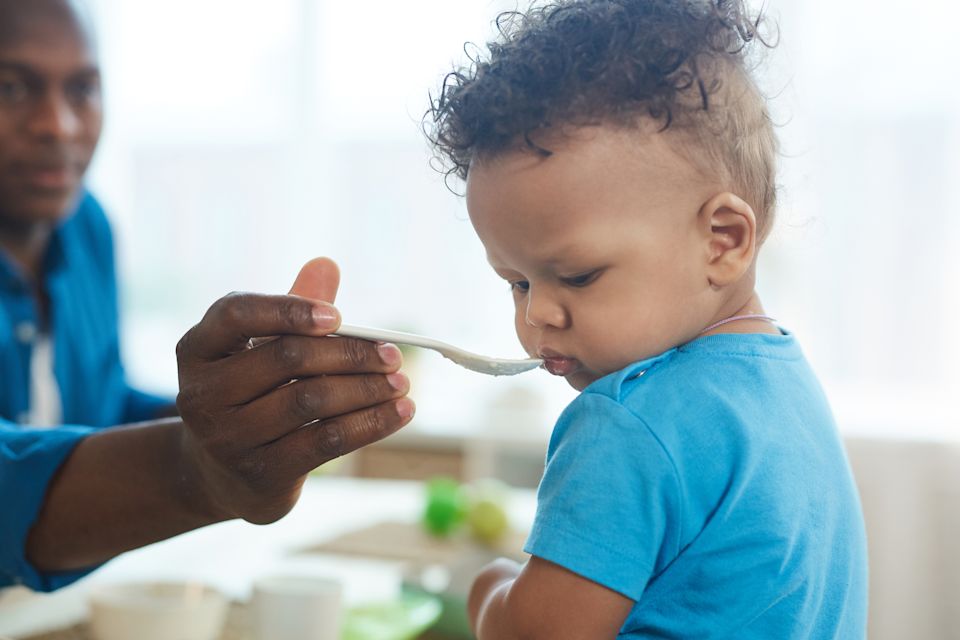
April 16, 2025
Understanding Newborn Behavior

भूक बदल: काळजी कधी करण्याची?

As a pediatrician, I understand that changes in your child’s appetite can be a source of concern for parents. Appetite fluctuations are common during childhood, especially during periods of rapid growth, developmental changes, or environmental adjustments. However, distinguishing normal variations from serious issues is crucial for ensuring your child’s overall health.
In this blog post, we will explore why appetite changes occur in children, when parents should be concerned, and strategies to help cope with these changes. By understanding the underlying reasons and knowing the warning signs, you can confidently manage your child’s eating habits and seek timely medical advice when needed.
एक बालरोगतज्ञ म्हणून, मला माहित आहे की तुमच्या मुलाची भूक बदलल्यामुळे पालकांमध्ये चिंता निर्माण होते. बाल्यावस्थेतील वाढ, विकासातील बदल किंवा वातावरणातील बदलामुळे भूक सामान्यतः बदलते. मात्र, या बदलांमधून नैसर्गिक बदल व गंभीर समस्या यांचे विभाजन करणे महत्त्वाचे आहे जेणेकरून आपल्या मुलाच्या एकूण आरोग्याची काळजी घेता येईल.
या ब्लॉगपोस्टमध्ये आपण समजावून घेऊ – मुलांमध्ये भूक बदल का घडतो, कधी काळजी करण्याची गरज आहे आणि या बदलांचा सामना कसा करावा. या मूलभूत कारणांबद्दल माहिती मिळवून तसेच चिन्हे ओळखून, आपण आपल्या मुलाच्या आहाराच्या सवयी व्यवस्थित ठेवू शकता व गरज पडल्यास वेळोवेळी वैद्यकीय सल्ला घेऊ शकता.
It’s important to know that appetite changes often reflect the natural growth processes. During growth spurts, children may either eat more or display a temporary decrease in appetite after the growth phase is complete. Seasonal changes, busy periods at school, and even emotional factors like stress or excitement can also contribute to shifts in eating patterns.
While many appetite fluctuations are normal, there are specific signs that indicate your child’s appetite change might need further attention. Watch for these red flags:
If your child consistently refuses to eat a variety of foods or is eating significantly less for more than a couple of weeks, it could be a sign of an underlying health issue. Inadequate nutrition can lead to deficiencies, weakness, and delayed growth.
Changes in appetite become concerning when they are accompanied by rapid weight loss or failure to gain weight as expected. In young children, steady growth is a key indicator of healthy development. Noticeable changes can be a sign of metabolic issues, infections, or digestive disorders.
A persistent lack of appetite along with signs of fatigue, irritability, or withdrawal can be symptoms of depression, chronic illness, or other systemic issues. These signs warrant a deeper evaluation by a pediatrician.
When loss of appetite is coupled with vomiting, diarrhea, or abdominal pain, it may indicate a gastrointestinal infection or intolerance. Timely consultation can help identify if an underlying condition, such as food intolerance or an infection, is the cause.
मुलांमध्ये बहुतेक भूक बदल हा नैसर्गिक असला तरी, काही चिन्हे दिसल्यास त्याकडे अधिक लक्ष देण्याची गरज असते:
जर तुमचे मूल सातत्याने विविध पदार्थ खाण्यास नकार देत असेल किंवा दोन आठवड्यांपेक्षा जास्त काळासाठी लक्षणीय कमी खावत असेल तर, हे अंतर्गत आरोग्याशी संबंधित काहीतरी समस्या असू शकतात. अपुरी पोषणामुळे घटकशक्तीचा अभाव, कमकुवतपणा व वाढीमध्ये विलंब होऊ शकतो.
भूक बदलासोबतच झपाट्याने वजन कमी होणे किंवा वाढीस कमी पडणे चिंतेचे कारण असू शकते. लहान मुलांमध्ये सतत वाढ ही निरोगी विकासाची चिन्हे असतात. वेगवेगळ्या चिन्हांमुळे एखादी चयापचय समस्या, संसर्ग किंवा पचन संबंधित विकार असू शकतात.
लागत असलेली भूक कमी असणे, सतत थकवा, त्रासदायक वर्तन किंवा सामाजिक थांबा असेल तर हे उदासी, दीर्घकालीन आजार किंवा इतर प्रणालीगत समस्यांचे संकेत असू शकतात. अशा चिन्हांमुळे मुलाचे मूल्यांकन सखोल करण्याची गरज असते.
भूक कमी असताना उलटी, अतिसार किंवा पोटदुखी यासारखी लक्षणे दिसल्यास पचनसंस्थेचा संसर्ग किंवा असहिष्णुता असू शकते. योग्य त्वरित सल्ला घेऊन समस्येचे मूळ शोधणे आवश्यक आहे.
Keep a food diary to track what your child eats over a period of time, including any associated symptoms like tiredness or discomfort. This record can be invaluable when discussing concerns with your pediatrician.
Encourage the consumption of nutrient-dense foods that provide essential vitamins and minerals even if your child’s overall quantity of food decreases. Incorporate fruits, vegetables, whole grains, and proteins in meals and snacks.
Children thrive on consistency. Regular mealtimes without distractions (like television or mobile devices) can help ensure that children are focused on eating their meals.
Involving your child in grocery shopping, cooking, and meal planning not only makes them more interested in their food but also helps you identify any unusual preferences or aversions that might be linked to appetite changes.
If you notice the red flags mentioned earlier, schedule an appointment with your pediatrician. An early evaluation is essential to rule out underlying conditions and to provide the necessary interventions or dietary modifications.
तुमच्या मुलाने काय खाल्ले याची एक आहार डायरी ठेवा, आणि त्यासोबतच थकवा किंवा अस्वस्थता यासारखी लक्षणे नोंदवा. हे रेकॉर्ड पालक म्हणून तुम्ही तुमच्या बालरोगतज्ञासोबत चर्चा करताना अत्यंत उपयुक्त ठरेल.
तुमच्या मुलाने किमान मात्रेत भले खाल्ले तरीही आवश्यक जीवनसत्वे व खनिजे मिळावीत म्हणून पौष्टिक पदार्थांचा समावेश करा. आहारात फळे, भाज्या, संपूर्ण धान्ये व प्रथिने यांचा समावेश करा.
मुलांना नियमित वेळापत्रकाची सवय असते व सुसंगत जेवणाच्या वेळी ते अधिक लक्ष देतात. टेलिव्हिजन किंवा मोबाईल डिव्हाइसेस अशा विचलनांशिवाय जेवणाचे वातावरण तयार करा.
सुपरमार्केटला जाणे, स्वयंपाक करणे किंवा जेवण नियोजनात मुलाला सामील केल्यास त्यांना जेवणात रस निर्माण होतो व त्यांची आवड लक्षात येऊ लागते.
जर आपण वरील चिन्हे पाहिली तर तात्काळ तुमच्या बालरोगतज्ञाशी अपॉइंटमेंट घेणे आवश्यक आहे. लवकर मूल्यमापन होणे महत्वाचे असून अंतर्गत समस्यांचे निराकरण करण्यास व योग्य आहारातील बदल सुचविण्यास मदत होईल.
Coping with changes in your child’s appetite can be stressful, but many fluctuations are part of normal development. By understanding when these changes are expected and knowing the warning signs that indicate a need for further evaluation, you can ensure your child remains healthy and happy. Remember, every child is unique, and maintaining open communication with your pediatrician is the best way to address any concerns you may have.
Monitoring your child’s eating habits, establishing routines, and focusing on nutrient-rich foods are all steps that can help manage these changes effectively. Don’t hesitate to seek professional advice if your child’s appetite change is accompanied by weight loss, behavioral changes, or gastrointestinal issues.
Stay proactive in supporting your child’s growth and health, and remember that informed parenting is the cornerstone of well-being.
तुमच्या मुलाची भूक बदलणे कधीकधी चिंता निर्माण करू शकते, परंतु बर्याच वेळा हा बदल नैसर्गिक विकासाचा भाग असतो. मुलाची भूक कधी नैसर्गिक आहे आणि कधी गंभीर चिन्हे दर्शवते हे समजून घेऊन तुम्ही तुमच्या मुलाचे आरोग्य चांगल्या प्रकारे वाचवू शकता.
तुमच्या मुलाच्या जेवणाच्या सवयींचे निरीक्षण, नियमित दिनचर्या तयार करणे, आणि पौष्टिक पदार्थांवर भर देणे यामुळे या बदलांचा योग्य सामना करता येतो. जर भूक बदलासोबत वजन कमी होणे, वर्तनातील बदल किंवा पचनासंबंधी लक्षणे आढळली तर वेळीच वैद्यकीय सल्ला घ्या.
तुमच्या मुलाच्या वाढीची आणि निरोगी विकासाची काळजी घेण्यासाठी सुरुवातीपासूनच जागरूक राहा, आणि शक्य तितक्या लवकर मुलाच्या आहारात कोणत्याही बदलाचे कारण स्पष्ट करण्याचा प्रयत्न करा.
Leave a comment